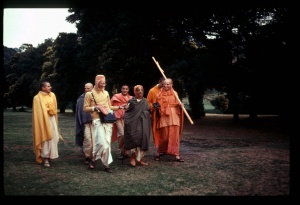SB 3.9.19

A.C. Bhaktivedanta Swami Prabhupada
TEXT 19
- tiryaṅ-manuṣya-vibudhādiṣu jīva-yoniṣv
- ātmecchayātma-kṛta-setu-parīpsayā yaḥ
- reme nirasta-viṣayo 'py avaruddha-dehas
- tasmai namo bhagavate puruṣottamāya
SYNONYMS
tiryak — animals lower than human beings; manuṣya — human beings, etc.; vibudha-ādiṣu — amongst the demigods; jīva-yoniṣu — in different species of life; ātma — self; icchayā — by the will; ātma-kṛta — self-created; setu — obligations; parīpsayā — desiring to preserve; yaḥ — who; reme — performing transcendental pastimes; nirasta — not being affected; viṣayaḥ — material contamination; api — certainly; avaruddha — manifested; dehaḥ — transcendental body; tasmai — unto Him; namaḥ — my obeisances; bhagavate — unto the Personality of Godhead; puruṣottamāya — the primeval Lord.
TRANSLATION
O my Lord, by Your own will You appear in the various species of living entities, among animals lower than human beings as well as among the demigods, to perform Your transcendental pastimes. You are not affected by material contamination. You come just to fulfill the obligations of Your own principles of religion, and therefore, O Supreme Personality, I offer my obeisances unto You for manifesting such different forms.
PURPORT
The Lord's incarnations in different species of life are all transcendental. He appears as a human being in His incarnations of Kṛṣṇa, Rāma, etc., but He is not a human being. Anyone who mistakes Him for an ordinary human being is certainly not very intelligent, as confirmed in Bhagavad-gītā (BG 9.11): avajānanti māṁ mūḍhā mānuṣīṁ tanum āśritam. The same principle is applicable when He appears as the hog or fish incarnations. They are transcendental forms of the Lord and are manifested under certain necessities of His own pleasure and pastimes. Such manifestations of the transcendental forms of the Lord are accepted by Him mostly to enliven His devotees. All His incarnations are manifested whenever there is a need to deliver His devotees and maintain His own principles.